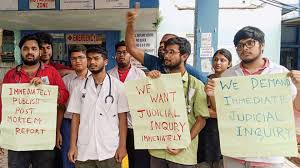Hospital services in multiple Indian cities were significantly affected on Tuesday due to a statewide doctors’ protest that broke out in response to the horrifying rape and murder of a trainee doctor in Kolkata. This is a huge and extremely worrying development. In addition to shocking the medical community, the terrible event at a government-run hospital has rekindled long-standing complaints about safety, working conditions, and the structural problems ailing India’s public healthcare system.
Police have confirmed that the 31-year-old trainee doctor who was found dead on Friday had been raped and murdered. After that, a volunteer police officer was taken into custody in relation to the incident. Outrage at this horrific deed resulted in large-scale protests that swiftly expanded throughout the state of West Bengal, beginning in Kolkata. By Monday, thousands of medical workers had taken to the streets to demand that the victim receive justice and that hospitals strengthen their security protocols in order to safeguard their profession.
On Tuesday, the demonstrations gathered steam as more than 8,000 government physicians from Maharashtra, including those in Mumbai, joined the cause. With the exception of emergency services, these doctors called for prompt action from the government and shown their unity by stopping work in all hospital departments. There were protests outside of Maharashtra as well. Junior physicians in white coats held signs that said, “Doctors are not punching bags” as they staged a sit-in protest outside a major government hospital in New Delhi, the nation’s capital. Other cities had similar protests, such as Lucknow in Uttar Pradesh and Goa, which had a major effect on the healthcare services in these areas.
The main association in India that represents physicians, the Indian Medical Association (IMA), takes a firm stance on the matter. The IMA brought attention to the “pedestrian working conditions, inhuman workloads, and violence in the workplace” that physicians frequently deal with in a letter to Health Minister J.P. Nadda. In order to shield medical staff from such tragic events and ongoing threats of violence, they pleaded with the minister to strengthen security in healthcare facilities.
As the protests intensified, a high court in Kolkata stepped in and directed that the Central Bureau of probe (CBI), India’s federal police, take over the probe into the trainee doctor’s death. This action demonstrates how seriously the case is being handled by the authorities and how important it is to the country.
The protests had an especially negative effect on Kolkata, as almost all government-run medical college hospitals suspended emergency services. N.S. Nigam and other state officials recognized the disruption and said the administration was keeping a careful eye on the situation to determine how it would affect health services more broadly.
The tragedy and the protests that followed have once again highlighted the pressing problems that doctors in India’s overcrowded public healthcare system face. These medical workers, who are overworked, underpaid, and frequently the targets of violence, are calling for significant reforms to guarantee their safety and dignity at work in addition to justice for the victim.
SOURCE:
REUTERS








